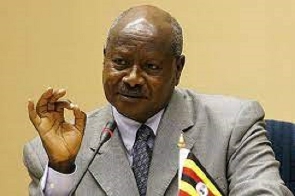Uganda President Yoweri Museveni has defended a decision to stop the purchase of petroleum products from Kenya, saying middlemen inflated prices by up to 59 percent, inflicting avoidable pain on consumers.
He said Uganda imports an average of 2.5 billion litres of petroleum annually valued at $2 billion (Ksh302.34 billion) though a sizeable portion of the bill comprised inflated fees by middlemen.
“Without my knowledge, our wonderful people were buying this huge quantity of petroleum products from middlemen in Kenya.
"A whole country buying from middlemen in Kenya or anywhere else! Amazing but true,” Museveni said in a statement on his official handle on social media platform X.
“Why not buy from the refineries abroad and transport through Kenya and Tanzania, cutting out the cost created by middlemen? Those involved were not bothered by these issues,” he added.
Museveni said a spot check a few months ago revealed exaggerated pricing by middlemen who, for instance, sold a tonne of diesel to Uganda at $118 (Ksh17,838.56) compared to $83 (Ksh12,547.46) from bulk suppliers—an equivalent of 42.1 percent variation.
For petrol products, middlemen offered Uganda $97.5 (Ksh14,739.49) per tonne compared to $61.5 (Ksh9,297.21) by bulk suppliers and refineries—meaning that the country paid an extra 58.53 percent to the brokers.
Museveni further said that Uganda purchased a tonne of kerosene from middlemen at $114 (Ksh17,233.86) against $79 (Ksh11,942.76) quoted by bulk suppliers and refineries— meaning that the pricing of the commodity had been inflated by 44.3 percent.
“These are prices when the products have arrived at the East African ports.
You can see the huge loss Uganda has been incurring on account of our wonderful people,” the Head of State said. He said Uganda has now contracted bulk suppliers and refineries to service its requirements, adding that his country has discussed the decision with both Kenya and Tanzania.
“We have now contracted bulk and refinery suppliers able to give us the lower prices.
I have discussed this with Kenya's President William Ruto and our delegation is now in Dar-es-Salaam discussing with President Samia Suluhu,” Museveni said.
He said a refinery scheduled to be built in Uganda would be a game-changer in petroleum pricing in the region.
“In a few years, our refinery will be up and running. I can assure the inland East Africans of competitive petroleum products, free of distributions caused by middlemen. The whole of Uganda, North-western Tanzania, Rwanda, Burundi, Western Kenya, South Sudan and Eastern DRC will benefit,” he said.
In the new fuel purchase arrangement, the Uganda National Oil Company (Unoc) will be buying the country’s entire fuel stock from Vitol Bahrain E.C before distributing it to oil marketing companies (OMCs) in Uganda.
“Unoc and Vitol Bahrain E.C have negotiated a five-year contract, and the partner will be financing the business by providing a working capital facility backed by its global balance sheet and working with UNOC to ensure competitive pricing of petroleum products,” Uganda said.
Uganda’s move comes after Kenya in March ditched the Open Tender System (OTS) that has been in use for importing fuel for nearly a decade in favour of direct procurement under a government-to-government deal with Saudi Arabia and the United Arab Emirates (UAE).
In the G-to-G deal, the three Gulf State-owned firms — Saudi Aramco, Abu Dhabi Oil Company (ADNOC), and Emirates National Oil Company (Enoc) — were given leeway to handpick local OMCs which would distribute fuel on their behalf.
Gulf, Oryx, and Galana were the local OMCs that were handpicked to distribute the fuel products to other oil companies for the duration of the deal.
The move by Uganda deals a heavy blow to Kenya’s OMCs which have been supplying 90 per cent to Uganda through their associates there.
The firms have been earning billions of shillings in revenue from transiting fuel to Uganda, which will not only affect local jobs but also reduce tax revenue collection.
The transit fuel has also been a critical source of US dollars for OMCs which allowed them to better handle the dollar shortage that hit Kenya in recent years, especially last year.
Uganda has further sidestepped Kenya and picked Tanzania to host buffer fuel stocks on its behalf to ensure stable supply in case of market disruptions.
Africa Business News of Tuesday, 7 November 2023
Source: theeastafrican.co.ke













